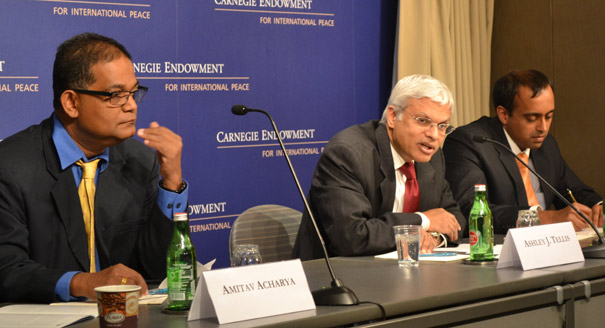Registration
You will receive an email confirming your registration.
India’s defense policies are in transition—and remain mired in controversy—as India continues its steady march toward great-power status. The challenges posed by India’s regional environment, the continuing problems of defense procurement, and the difficulties of reforming Indian national security institutions are serious and could prevent India from becoming a successful provider of security in Southern Asia and in the Indian Ocean.
Carnegie’s Ashley J. Tellis was joined by Amitav Acharya and Manohar Thyagaraj to discuss where India’s defense policy stands, at both the strategic and operational levels.
Strategic Adjustments
- Looking Northeast: The participants all agreed that China has displaced Pakistan and other subcontinental actors as the primary force structuring factor in India’s defense strategy. Specifically, Tellis observed that India is building up capacities where it shares frontiers with China.
- Back to the Future: On the Pakistani front, Tellis argued that the Indian army appears to be reverting to its more traditional posture of preparing for strategies of attrition, abandoning a more recent attempt to develop operational maneuver warfare that might have allowed for a quick defeat in the event of conflict.
- Soft Power: Acharya stated that in the contest for regional influence between India and China, India’s democratic politics gives it an ideational advantage.
Operational Challenges
- Hardware Updates: Tellis described the modernization processes underway in the Indian Army, Air Force, and Navy which encompass both doctrine and force posture. He pointed out that these are ongoing efforts that still face significant domestic constraints.
- Matching Procurement to Policy: Thyagaraj argued that India’s defense procurement enjoys a minimal relationship to strategic objectives, with most procurement being ad hoc.
- Making Friends with Vendors: Thyagaraj characterized the procurement process in India as “vendor-adversarial,” noting that corruption fears had generated a series of processes that ironically increased the contact points with the bureaucracy and therefore the opportunities for corruption. He suggested that India ought to take steps to make procurement processes less onerous for Indian suppliers.
Carnegie is grateful to the Indian Council for Cultural Relations for its support of this event.
